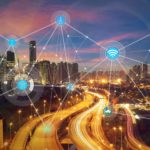The ‘Internet of me’; when success “depends on people"
‘Internet of me’, the trend towards content specialization based on user profiles, is becoming a pivotal strategy on which forward-looking companies are focusing. We analyze the current status, growth prospects, the reasons why it is becoming such a big issue and its connections with blooming technology trends.

The winners in the digital age are those who go beyond technological innovation and know that "their success depends on people". This is one of the key findings of this year’s Accenture Technology Vision 2016 report. A year ago, Accenture already pointed out that the 'Internet of me' was changing “the way people around the world interact through technology, putting the end user at the center of every digital experience.”
Bruno Cendón, Engineer and IoT entrepreneur, technical director of startup TST, affirms that "given that the digital world starts making sense the moment we are able to create a service that offers a certain added value, customization is key for the optimization and constant upgrading thereof. We all like it when the services we enjoy make us feel exclusive, and this is also true in the digital world."
Why it is important for companies
Moving customers. Making them feel unique. Enthralling them. Companies are changing the way in which they create new apps, products and services. They are betting on building highly customized experiences that resonate with customers without undermining their trust. Just as Accenture certifies, “the companies that succeed in this new Internet of Me era will become the next generation of household names.”
Many giants are already hard at work on it. The data an IoT revolutions have contributed to the cause. Cendón highlights how our day-to-day online activity, locations, calls, messages, physical activity, etc. are totally monitored by the devices we use every day.
Moving customers. Making them feel unique.
In fact, many of us aware now of how Google, Amazon or Facebook use this information to customize all their services, even crossing beyond their domains through contextual advertising. “It is just a matter of time that this level of customization starts being applied to all the connected devices we use on our daily lives,” he adds.
Besides understanding how customer needs, priorities and habits change, companies face another challenge: they need to face a cultural corporate change, and get the best out of their workers, leveraging, for that purpose, technology.
Internet of Me and Big Data
Each interaction becomes a customized experience. Many of the things that surround us are becoming smart devices and data are an essential part of the process. Companies are no longer just offering “things” but have begun to create products and services tailored to fit the needs of individuals – thanks to, of course, the internet.
Thus, it is true that the Internet of Me and Big Data are joining their strengths by constantly gathering, contextualizing and analyzing data and collecting high value information about us.
Each interaction becomes a customized experience
César García, computer engineer and speaker specializing in digital manufacturing, the Internet of Things, open design processes and smart cities, sees the link clearly: “In this sense it is crucial to use this type of big data technology to create the individual profiles of millions of users and customize the experience," he explains.

As Fuencisla Clemares, country manager Spain and Portugal at Google, put it last September speaking from the MasterCard Innovation Forum (MIF16), "personalization is pivotal in the digital future, to the point that Google now prefers not to talk about Internet Things, but the Internet of Me.”
“Our aim is to use user personal data to predict and be able to provide custom results to each one of them,” said Clemares. This is how advances such as Google Assistant (smart assistant that Google is embedding into all of its products) or Google Home, the future epicenter of the connected home, have been developed.
Bruno Cendón does not go that far. He does not see the Internet of me as a specific area of the Internet of Things, although he acknowledges that “personal communication handhelds have been a reality for many years now, and have evolved from basic voice and text enabled devices, to authentic sensor-loaded always-online machines, capable of doubling as platforms to support a wide range of wearables and IoT devices.” For Cendón, more than presenting a direct link, they are a complement that will help in the customization of that Internet of Me.
Where we are heading towards
Hyperconnectivity, total interaction between elements and groundbreaking user-centric services. That is, in part, the digital scenario of the future.
If we analyze the current context, the possibilities are truly incredible. On the one hand, as César García summarizes, our online activity is being constantly monitored: all our data, all our clicks and movements are detected and analyzed to adapt the experience. "This creates a tunnel effect, in which we only see and experience whatever top brands decide we should see. In many cases these actions are detrimental, resulting in ads for trips that haunt our browsing experience, ads that stopped being relevant from the moment we purchased our tickets,” he says.
All our data, all our clicks and movements are detected and analyzed to adapt the experience
That is why, he believes, being able to transform the foundations that support the services offered online is the key to the future. Right now it seems that the only viable mechanism is to enjoy free services at the expense of our privacy. “New alternatives have to come out capable of sustaining these infrastructures without requiring us users to share the last detail of our private lives. These transformation mechanisms can be political, social or technological,” he concludes.
*If you are interested in this subject, connect with BBVA at LinkedIn to get related information and info on similiar topics